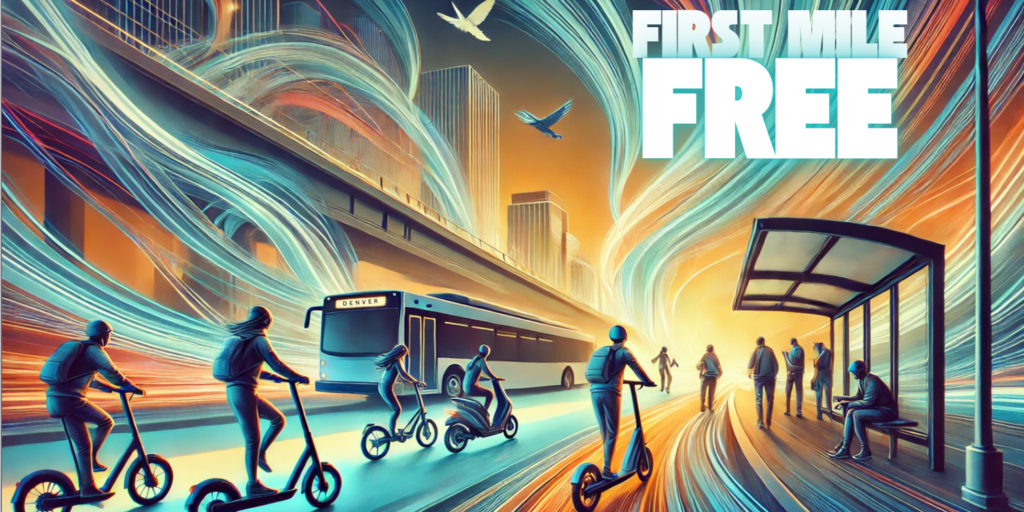GDT > First Mile Free

In Brief
The City of Denver is smart to focus on mode shift – it’s the key to cleaner air, lower emissions, and a more connected and vibrant city. But 75% of residents live beyond easy walking distance to transit1, and 39% cite access as their biggest barrier.
First Mile Free directly closes this gap by making both micromobility and public transit more accessible – driving mode shift on two fronts. By covering the first mile of e-bike and scooter trips ending at approved transit stops, the program ensures a seamless, affordable connection to transit. Unlike traditional subsidies, it’s automatic – no applications, no extra steps. Riders simply pick up a bike or scooter, park at transit, and the discount applies instantly.
Problem Statement
Denver’s transit system isn’t reaching its full potential because too many residents lack a reliable way to reach it. Micromobility exists but isn’t integrated into transit, and without public funding, it remains costly and unreliable. As a result, many low-income and transit-dependent residents are left without viable transportation options. The outcome? More cars, higher commute costs, and longer travel times – all undermining mode shift goals. Without a first-mile solution, residents will keep driving instead of choosing more sustainable options.
Analysis of Options
| Policy Option | Mode Shift Impact | Cost Efficiency | Equity & Affordability | Additional Benefits |
| Status Quo (No Changes Made) | Low – transit access remains a barrier | $0 spent, but no new riders | No targeted affordability improvements | No impact on emissions, traffic, or safety |
| Subsidized First Mile Free | High – covers 20K trips to transit per $100K | Highly efficient – ~$5 per first-mile | Expands access to lower-income riders | Cuts commute times, reduces emissions by 59% per ride, clears sidewalks |
| Expanding RTD Shuttle Service | Moderate – limited reach | Expensive – high operational costs | Some impact in specific areas | Higher costs, requires new infrastructure |
Findings: The First Mile Free model is the most cost-effective, scalable, and immediate solution to improve transit access while delivering multiple citywide benefits.
Recommendation & Action Plan
● Fund First Mile Free with $100K–$300K to cover 20,000–60,000 trips, with potential public-private partnerships to reduce costs.
● Roll out strategically – either citywide or incrementally (starting with key Opportunity Areas or focusing on rail stations first).
● Track ridership impact and evaluate expansion based on mode shift KPIs.
Expected Outcomes
● More Mode Shift – Pays for 20K first-mile micromobility trips, driving transit ridership.
● Lower Emissions – Cuts CO₂ by 59% per ride vs. personal vehicles.
● Less Traffic, Cleaner Air – Reduces car trips, cutting congestion and tire and brake dust pollution.
● Faster, Cheaper Commutes – Halves commute times (vs. walking to transit)3, lowers costs, and expands access for low-income residents
● Safer, Clearer Streets – Keeps scooters at transit stops, reducing clutter; encourages shorter, safer trips.
● Stronger Citywide Connections – Enhances multimodal network, retail foot traffic, and neighborhood cohesion.
First Mile Free would make Denver the first city to integrate e-bikes and scooters into transit in this way. By making the first mile effortless and free, it drives mode shift on two fronts – boosting both micromobility and transit use. First Mile Free means fewer cars, cleaner air, faster commutes, and safer streets – all through a simple, scalable solution that maximizes existing infrastructure.
